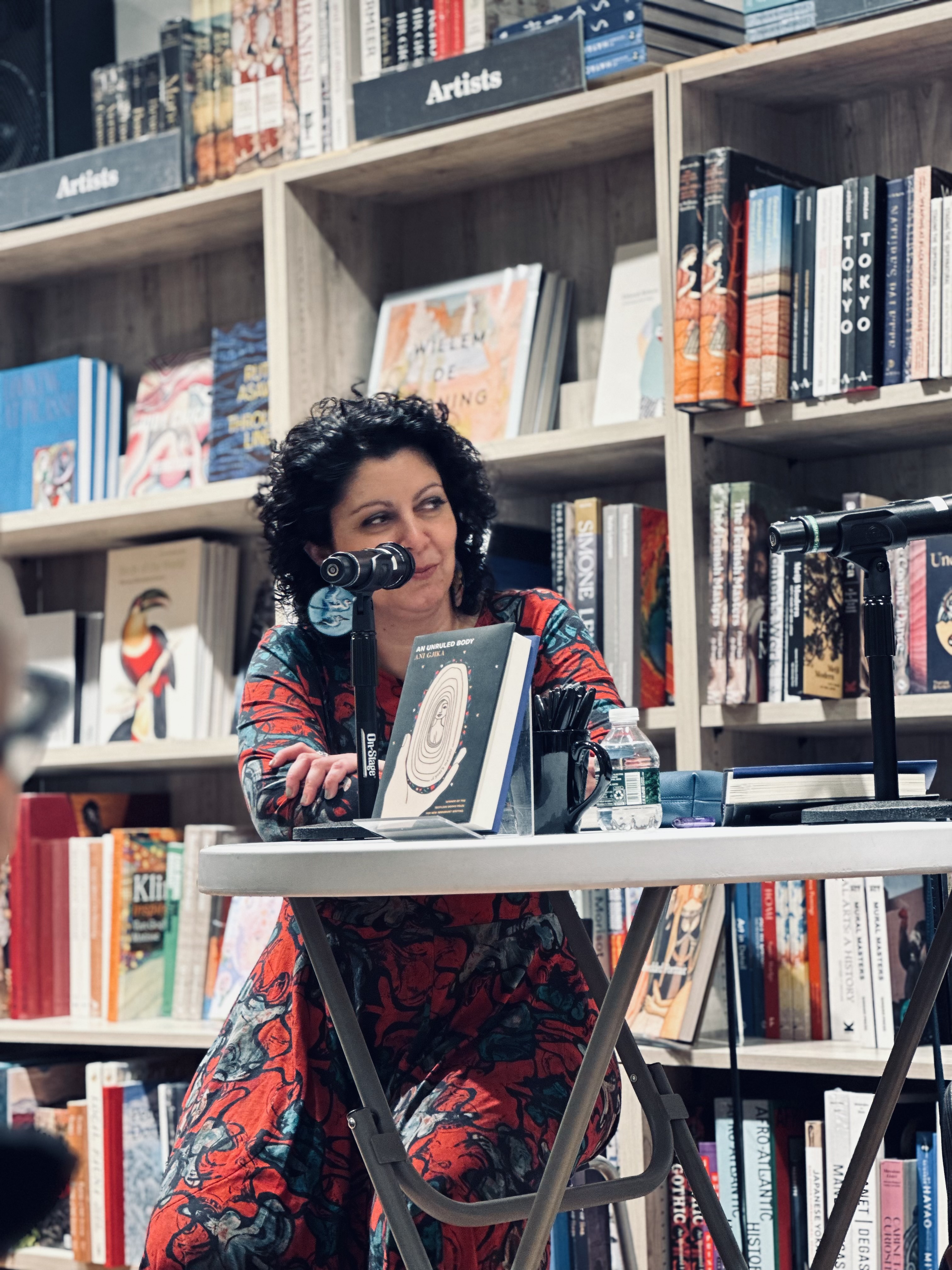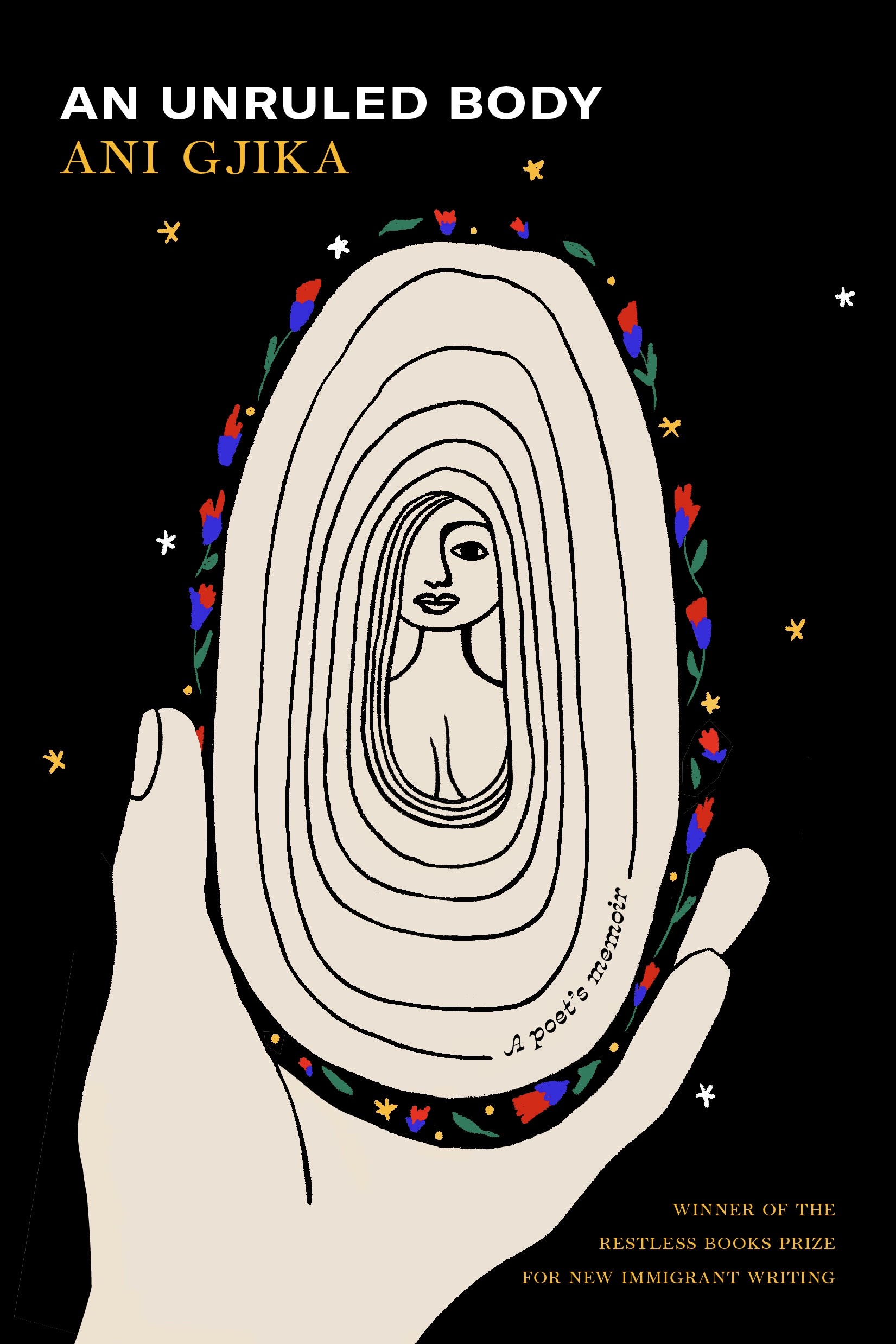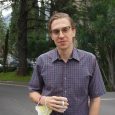Though religious practice of any kind was viciously persecuted in communist Albania, as a child Ani Gjika never had any sense that being part of a secret Protestant family was dangerous or exciting. All she knew was that she mustn’t share her grandmother’s Bible stories with anyone outside the family.
This history is only one of many threads explored in Gjika’s recently released memoir “An Unruled Body: A Poet’s Memoir” (Restless Books, 2023). In it, Gjika — a poet, teacher, translator and now memoirist — explores her childhood in a Seventh Day Adventist family during Hoxha’s Albania. After communism falls and Albania enters the wild 1990s, young Gjika must suddenly carry the weight of the strict patriarchal conservative upbringing in her family alongside an explosion of gendered violence outside the home.
As she faces years of constant sexual harassment from roving groups of men as well as street assaults from boys her age and men decades older, there’s a terrifying awareness of acquaintances who have faced sexual assaults or sexual slavery. The strain is made worse by the psychological trauma of the rape she suffered as a 12-year old, a sexual assault she told no one about for two decades.
When her family wins the green card lottery in 1995, Gjika leaves for the U.S. to start a new life in a new language, hoping to put her teenage years behind her. Moving to Thailand after college to be closer to an Indian man she’s fallen in love with online over their mutual love of poetry, Gjika soon learns that the sexual traumas from her past still have their grip on her.
In fearlessly honest and open prose, the memoir charts Gjika’s slow process of learning how to move past these traumas and how converting from Seventh Day Adventist to a nearly religious devotion to poetry and language helps her reconnect with her sexuality and desire.
K2.0 spoke with Gjika over the holidays about illegal Christians, translating Albanian poets and how the patriarchy can shatter a woman’s relationship with her own body.

Credit: Ani Gjika
There’s often a “death of the dictator” moment in writing about places like Albania or the Soviet Union. In your memoir, you write about the death of Enver Hoxha from your perspective as a small child and about your memory of feeling confused and alienated by the public displays of mourning. Your childhood response was to write a poem. Where did the impulse to turn to poetry come from?
I think because I listened to poems and nursery rhymes from my grandmother. I really loved memorizing all of them. So I was constantly reciting poetry as a little girl. And then when Enver Hoxha died it was a very puzzling day for me. Why is everybody crying so hard? Why is the teacher completely removing us from our daily activities?
The typical day at school is just, you’re there, you’re sitting and listening, you’re reciting the lesson. And then suddenly they take us outside behind the school, far off into a clearing, off into nature, and we had never done that before. And then they tell us that this person died. So the way they gave us this information was so unprecedented.
And then they let us go early. I remember seeing all these montages on TV of people walking and crying. And then my grandmother was crying. I just didn’t understand why people were doing all this. And I think the impulse was trying to understand what’s happening, like being faced with something I don’t understand and then trying … using language to try to figure it out.
You’ve been a poet more or less since that day, and you’ve published your own poetry in the U.S. as well as translating Albanian poets into English. You write in “An Unruled Body” that your mother is a poet as well?
She has always written. Before I was born, she already had two books of poems out. And then I think she went through a period of 20 years where she didn’t publish anything. I think it was as a result of being told things like: “you cannot publish this book unless you start with a poem that praises the Labor Party.”
So I think she stopped maybe as a way of protesting that or just feeling she didn’t want to be censored that way. Also, the life she was living was pretty intense. She had to work long hours outside of the house and then come home to two children.
And, you know, living at that time, feeling like you’re being watched … I mentioned in the book how she was in trouble for some time because of her correspondence with a Kosovar poet. So I think she stopped writing for 20 years for all of these different reasons and then picked it up again once we moved here to the U.S. So she’s been an immigrant writer these last 27 years. She’s written three or four more books since then.
You’ve translated the poetry of Xhevdet Bajraj as well as Albania’s poet laureate Luljeta Lleshanaku. But your poetry is in English and you’ve now published your memoir in English. Do you ever have the urge to write in Albanian? What’s your relationship to languages in your own writing practice?
I started as a writer in Albanian when I lived there. I wrote poems and I remember loving composition class, literature classes. And then I moved here to the U.S. and became an English major and I was surrounded by English.
I never really had Albanian friends here, especially in college, where I was the only Albanian speaker. So I started to think in English, write in English, and then later on teach English. I’ve translated a little bit from English to Albanian to share poems with my mother. I’ve done a little bit of that, but very informally, just for my mom.
I feel like my creative language in Albanian is not as vivid or exciting or playful as I can make my English. I feel like I’m more at home in English because I’m so immersed in it.
But now that this book has come out, I’m having to communicate with a lot of Albanian people who are reading it and responding to it. And I’m writing back to them sometimes half and half English and Albanian and sometimes fully in Albanian. I have this feeling that if I go to Albania to visit for some time, I might write something in Albanian. But I don’t know, I can’t force anything. Whatever will come will come.

Ani Gjika covers topics ranging from Enver Hoxha’s death to translating Albanian poetry to sex and sexuality in “An Unruled Body: A Poet’s Memoir.” Credit: Ani Gjika
At one point in the book you are describing the years of gendered violence that you both witnessed and experienced in the 1990s and you write: “I did not survive girlhood. I avoided it. And when the womanhood arrived, I was unprepared to recognize it.” Later in the epilogue the reader learns that you’ve visited Albania only once since you left in 1996 as a teenager. Your memoir is a searing dive into your own personal history and a return to a home you’ve left behind. Is your project of translating Albanian poets part of this same project, a return to Albania through its literature?
Yeah, that’s a very good question. Because I do think they are related in the sense that maybe I picked up translating from Albanian to English as a kind of backwards way of coming home. I was removed from the country sort of not by my choice. My dad won the green card lottery and I was 18. Obviously I was going to go with my parents. And also I wanted to leave because of how difficult it was to be there at that time.
But in some ways I do have this longing … you know how you have a longing sometimes for a place or something you don’t understand?
I picked up translation for different reasons. My first reason was that, wow, I love this poetry. This was Luljeta Lleshanaku’s work. And I was like, this has to be shared. I want to be the person who brings more exposure to her work.
But I think underneath that was the desire to connect again with the language, with the culture, the people that I feel I have lost a connection from, maybe by choice. I think I rejected Albanian. When I came here to this country, I just wanted to become fluent in English as a way of forgetting those things that happened and having this new identity, like “I’m more independent,” or, you know, “nothing can hurt me here.”
“You know how you can have a longing sometimes for a place or something you don’t understand?”
You write that the 1990s in Albania are sometimes referred to as “a time when the boys teased the girls,” and then you show what a cruel and violent euphemism “tease” is. The book is all about how experiencing this time period affected your ability to feel open about your own sexuality and connect to others. I’m curious about what your thoughts are on how you think it affected other Albanian girls and society more broadly.
I only have the experience of someone who grew up in the capital city. So I feel like I don’t know how it was for other young women in towns or further in the periphery. But it was a patriarchal culture. It still is. You still hear things in the news about domestic violence or women being killed.
But I feel like I can’t really speak to how it’s affected them now because I’m removed, right? I haven’t lived there for so long, but just from hearing these things in the news or seeing that there is a #MeToo movement of some kind in the last few years in Albania, it’s happening. So it makes me think that they need more of this. They need more awareness … or at least the men need to be more aware of how difficult it has been for young women, girls, women.
As an adult, your grandmother converted from Orthodox Christianity to Seventh Day Adventistism prior to World War Two after meeting an American Protestant missionary. You were raised in a secret Protestant household in the 1980s, a time when religious practice was strictly illegal and heavily persecuted in Albania. Can you tell me a little bit more about that secret practice?
I wasn’t aware at the time that it was exciting. When I think of it now it’s exciting that I had this grandmother who told me the most wonderful stories. The Old Testament stories are amazing to me; they were literature. That’s probably where I got a love of storytelling. Because of all the details like Jacob and the coat of many colors and Jonah and the whale. Like, oh my goodness.
And then also we prayed. So my grandmother would tell us, “okay, come let’s pray,” and make me kneel with her. This is something I would never talk about outside because it was relayed to us: don’t talk about this. I don’t remember specifically my parents or my grandmother saying this, but you understand this because when somebody knocks on the door and she has to hide the Bible under the covers of the bed. You see this happening, so you know this is something you don’t talk about. It becomes part of the fabric of living under communism.
“The Old Testament stories are amazing to me; they were literature.”
You write that your grandmother was part of a secret network of Protestants that was squashed in the 1950s. By the time you were born, were there other secret Christians your family was connected to or was it just your immediate family?
It was limited within my own family. My grandmother moved in to live with us when I was born to take care of me and my brother while my parents were at work. We didn’t go to kindergarten or preschool. She was with us right from the very beginning and we lived together, the five of us. Sometimes her other son would come to visit us with his daughter and his wife, there were three of them. She would also pray with all of us once in a while, not very often, but they were in on it too, they followed her beliefs.
My grandmother also had a daughter in Korça who would visit us maybe once a year. Whenever an uncle or an aunt would visit, she would also pray with them. This was on my father’s side, but my mother embraced it too once my grandmother came into the family, into the house.
We were all converted but not baptized until the 1990s. My grandmother wasn’t baptized until she was in her 80s.
When communism fell and missionaries came back to Albania in the 1990s, they discovered your grandmother and how she had remained a secret Seventh Day Adventist for decades. She then became a star in the world of Seventh Day Adventist global media. She’s a fascinating character and she made me think about Lea Ypi’s grandmother from her recent memoir “Free.” Here also is an Albanian woman who had a full life prior to communism, in this case as the daughter of an Ottoman pasha, and who, like your grandmother, manages to outlive communism by relying on her immense inner resources. Two recent memoirs by Albanian women living abroad — two phenomenal grandmothers. What’s up with that?
I guess it maybe speaks to that culture of growing up with your elders near you or having several generations in the same house, and that there’s so much wisdom from those elderly people. And that person has lived through so much.
My grandmother came from a generation where they studied Greek in elementary school. And then, I don’t know what happened, but she only had five years of schooling. And then Bibles were completely prohibited and she had this Greek Bible laying around from before communism. She had that and she used the language she had learned in school and probably got even better in her Greek through reading this Bible.
No Albanian-language Bible?
No. She only had this Greek Bible.
She had heard that if you read three chapters a day and five on Sabbath, which is Saturday for Seventh Day Adventists, you can read the entire Bible from January 1st to December 31st fully. And she did that faithfully for decades. So she read this Greek Bible, I don’t know, at least 40 times.
And then she would translate for us. She had her notebooks full of translations. These missionaries from England, when they discovered her after communism, they basically took everything to keep it somewhere, because it was special. But I don’t even know where they are now. It has to be in England, in London somewhere. So yeah, they have her Bible.
She also knew she had to keep the tithe, which is 10% of everything you earn. But sometimes people would come and bring her money for New Year’s or her birthday. Her sons would give her money. She would take a 10th of even that and save it. Typically Seventh Day Adventists would give that to the church every week or so. But because there was no church, she kept it all in this box for 48 years before she handed it over.
Your book opens with an extended passage where you are masturbating in your car, overcome with explosive desire after your unsatisfying and somewhat abusive marriage ended. This sets the tone for the book, which addresses sexuality, desire, and gendered violence in a very open and honest manner. Given that much of the book addresses the conservative patriarchal environment of your childhood, were you worried how readers, perhaps particularly from your broader Albanian community, might respond?
Yeah. But a lot of the responses have been very positive. And I haven’t gotten any negative feedback from Albanian readers. Everybody seems to be appreciative and excited that there’s this book where the narrator talks about these things openly.
But I have always thought that this is what I need to write. I’m the one who can do this. This is this experience that I’ve had. This is what I’m able to write about. If I don’t write this, who will?
“I have always thought that this is what I need to write.”
You’re a poet and translator, and now a memoirist. Do you see this book as an Albanian memoir? As an American memoir? What type of writer do you see yourself as?
I never really think about these labels or like schools of writing or even genres. When somebody says, oh, are you a poet or are you a fiction or non-fiction writer … I don’t know. I’m sure some people really need to state directly: “I am a poet,” or “I am a fiction writer.” But I feel like I’m more liminal. I just see myself as a writer.
When I was writing this memoir, I was just excited about telling the story. And then when I started putting in poetry fragments here and there, it felt more playful. So I’m just excited to make things. I’m a maker, I’m a creator, I’m a writer, I’m an artist.
This article has been edited for length and clarity. The conversation was conducted in English.
Feature image: Ani Gjika.
The content of this article is the sole responsibility of K2.0. The views expressed in it are the author’s and do not necessarily reflect the views of K2.0.
Curious about how our journalism is funded? Learn more here.



